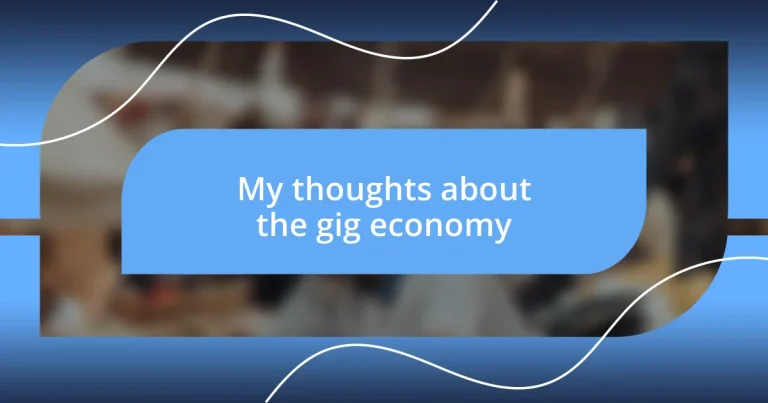Key takeaways:
- The gig economy offers flexibility and autonomy but comes with challenges such as financial instability and lack of benefits, prompting a careful evaluation of its merits and pitfalls.
- While it empowers individuals to pursue diverse opportunities and develop unique skills, intense competition and the absence of a safety net can lead to stress and insecurity among gig workers.
- Emerging trends in the gig economy include increased specialization, reliance on technology for efficiency, and a growing sense of community among gig workers, potentially redefining job security and support networks.
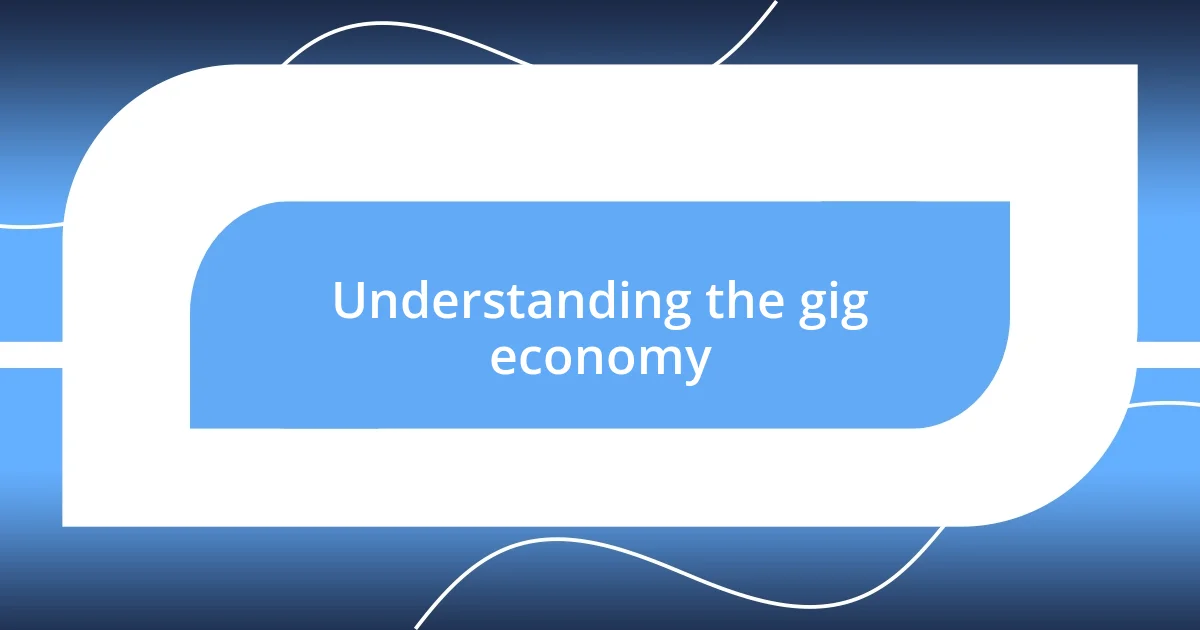
Understanding the gig economy
The gig economy has transformed the way we perceive work. I remember my first experience as a freelance graphic designer; the thrill of choosing projects that excited me contrasted sharply with the rigid schedules I’d previously endured. It’s fascinating—how many of us find our passion projects in the digital realm while grappling with the uncertainties that come with gig work?
At its core, the gig economy offers flexibility and autonomy, but it can also be a double-edged sword. Have you ever felt the pressure of not knowing where your next paycheck might come from? When I started relying on gig work, the adrenaline rush of potential income often mixed with a nagging anxiety about financial stability. It’s a delicate balance that many gig workers navigate daily.
Moreover, platforms like Uber or Upwork have opened doors for countless individuals, allowing them to monetize skills in diverse ways. Yet, I often wonder—does the convenience of these platforms overshadow the lack of benefits and protections that traditional jobs typically provide? Seeing friends dive into gig work only to realize they miss the security of a steady job reminds me that understanding the gig economy requires us to weigh its merits and pitfalls carefully.
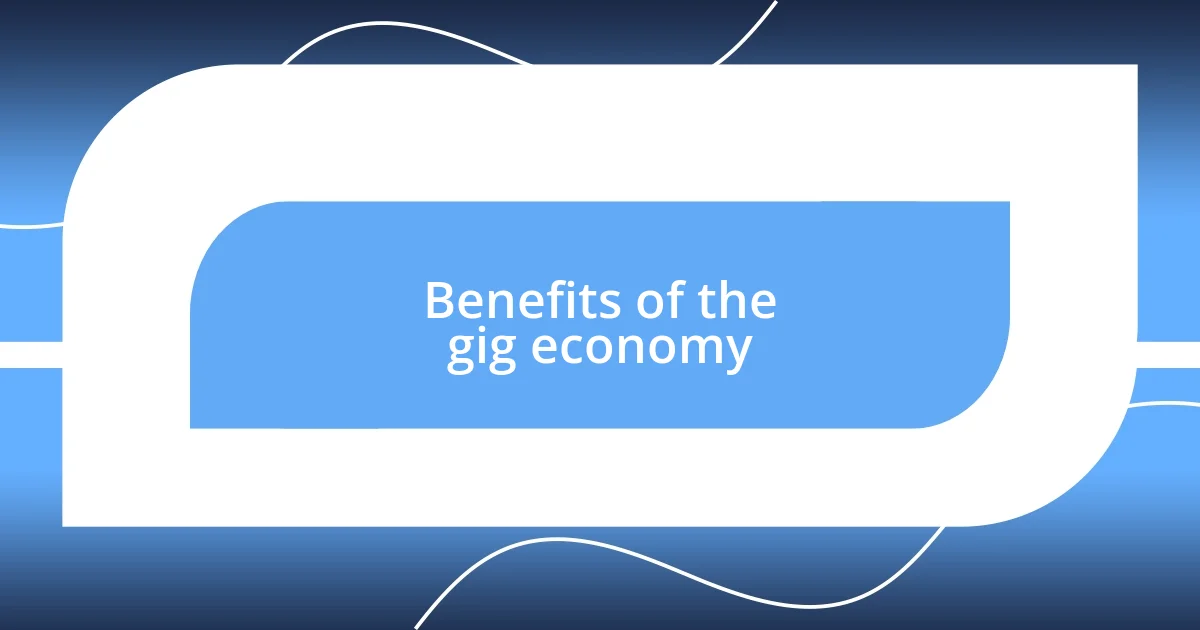
Benefits of the gig economy
The gig economy brings with it a level of flexibility that many find liberating. I remember a time when I was able to work from a cozy café rather than an office cubicle, fitting my tasks around a schedule that suited my lifestyle. Being able to set my own hours means I can prioritize projects or even take breaks whenever I feel the need. This autonomy is a huge draw for many, especially those with other commitments or passions.
Here are some key benefits of the gig economy:
- Flexibility: Choose when and how much you work, allowing you to better balance personal and professional life.
- Diverse Opportunities: Access to a wide range of projects and industries, enabling skill development and exploration.
- Extra Income: The chance to earn additional money alongside a traditional job or during less busy periods.
- Entrepreneurial Spirit: Encouragement to cultivate and market your unique skills, giving you a sense of ownership over your career.
- Remote Work Potential: Opportunities to work from anywhere, which can be a game-changer for many who crave a change of scenery.
I’ve had friends find their niche in gig work, thriving on the variety it offers. One close friend turned her love for photography into a side hustle, discovering fulfillment by collaborating with local businesses for their marketing needs. This kind of innovation demonstrates how the gig economy can empower individuals to carve out their own niche and truly follow their passions.
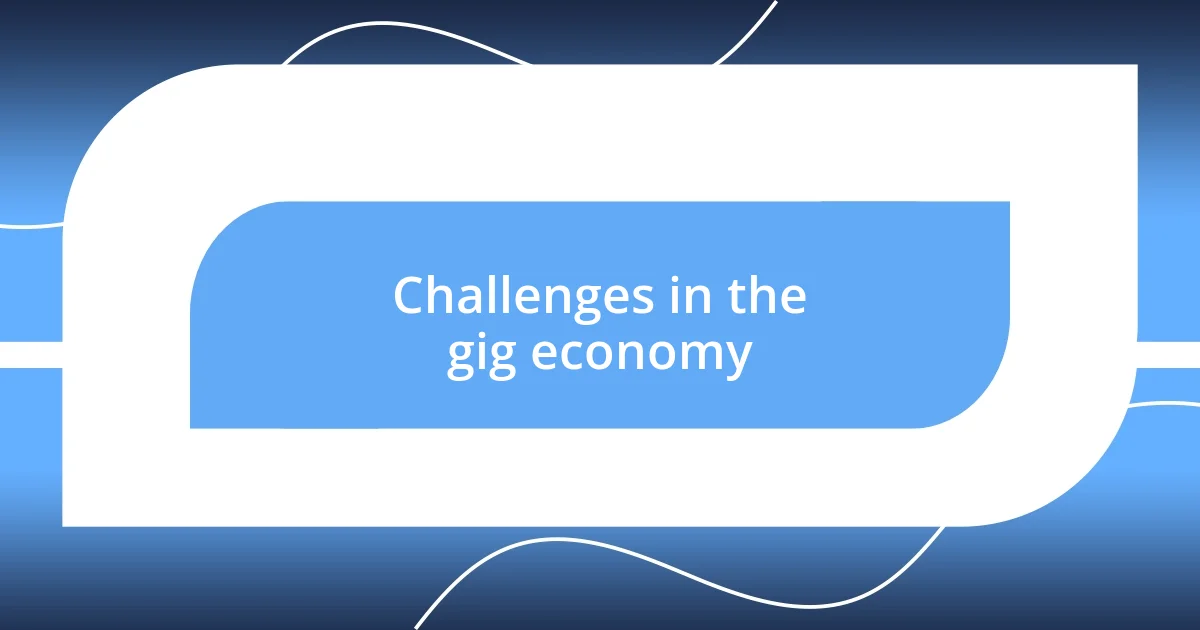
Challenges in the gig economy
The gig economy does present significant challenges that often weigh heavily on those participating in it. Take, for example, the issue of financial instability. I remember a particularly lean month where I had more rejected proposals than accepted ones. That experience taught me firsthand how unpredictable earnings can create stress and uncertainty in my life, affecting not just my work but my emotional well-being too. It’s a stark reminder that while gig work can be liberating, it can also turn into a game of financial roulette.
Another challenge that often emerges is the lack of benefits that traditional jobs afford. When I transitioned into freelancing, I quickly realized how reliant I had been on employer-sponsored health insurance. Suddenly, I was responsible for my own healthcare costs, which felt daunting. Many gig workers face a similar reality—without paid sick leave or retirement plans, it’s difficult to build a safety net. This lack of support can weigh heavily on one’s mind, as financial planning takes on a new layer of complexity.
Furthermore, competition is fierce in the gig economy. There might have been a time when I felt a rush of excitement at the prospects of landing a new project, but that quickly shifted to anxiety when I recognized how many others were vying for the same work. It often feels like a race against time and talent, leaving many talented individuals struggling to stand out. In a world that thrives on instant gratification, staying resilient becomes essential, even as the competition continues to grow.
| Challenge | Personal Insight |
|---|---|
| Financial Instability | Feeling anxious during lean months can make you question your choices. |
| Lack of Benefits | Realizing I’m responsible for healthcare costs was eye-opening and somewhat overwhelming. |
| Intense Competition | The rush of excitement to land projects can quickly turn into anxiety over standing out. |
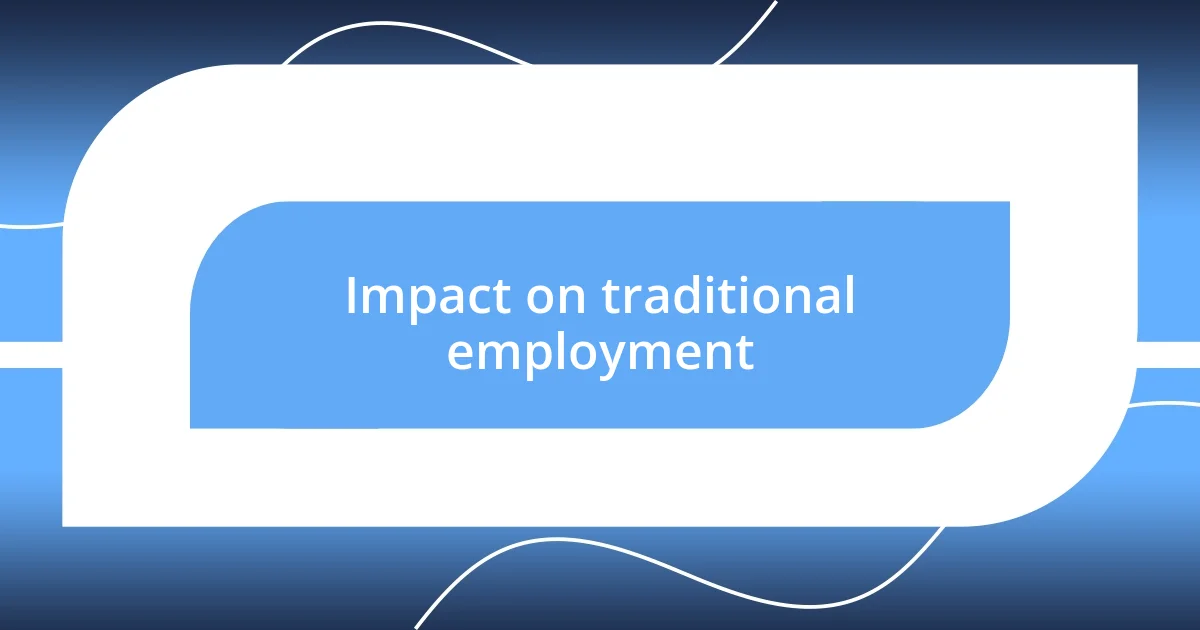
Impact on traditional employment
The rise of the gig economy has undeniably shifted the landscape of traditional employment. I’ve noticed that many of my friends, who once enjoyed stable nine-to-five jobs, are now considering flexibility over security. This change can be both exhilarating and daunting—how do you balance the safety of a predictable paycheck with the allure of controlling your own schedule? It’s a question many are wrestling with today.
For me, this shift opened my eyes to how traditional roles are evolving. I once worked alongside professionals in a classic office setting, but now, I’m seeing these same individuals create their brands and pursue freelance work. This transition often reflects a desire for autonomy that traditional jobs may not offer. I ask myself, what happens to the traditional workforce when more people opt for gigs over stability? It seems like the security blanket is slowly being put away.
Moreover, I’ve seen that companies are responding to this gig trend by rethinking their workforce strategies. Some organizations have started hiring fewer full-time employees and relying more on freelancers for specific projects. While this might save costs, it can lead to a feeling of instability for those who prefer a consistent workplace environment. I can’t help but wonder: is this a temporary phase, or are we witnessing a fundamental change in how work is structured?
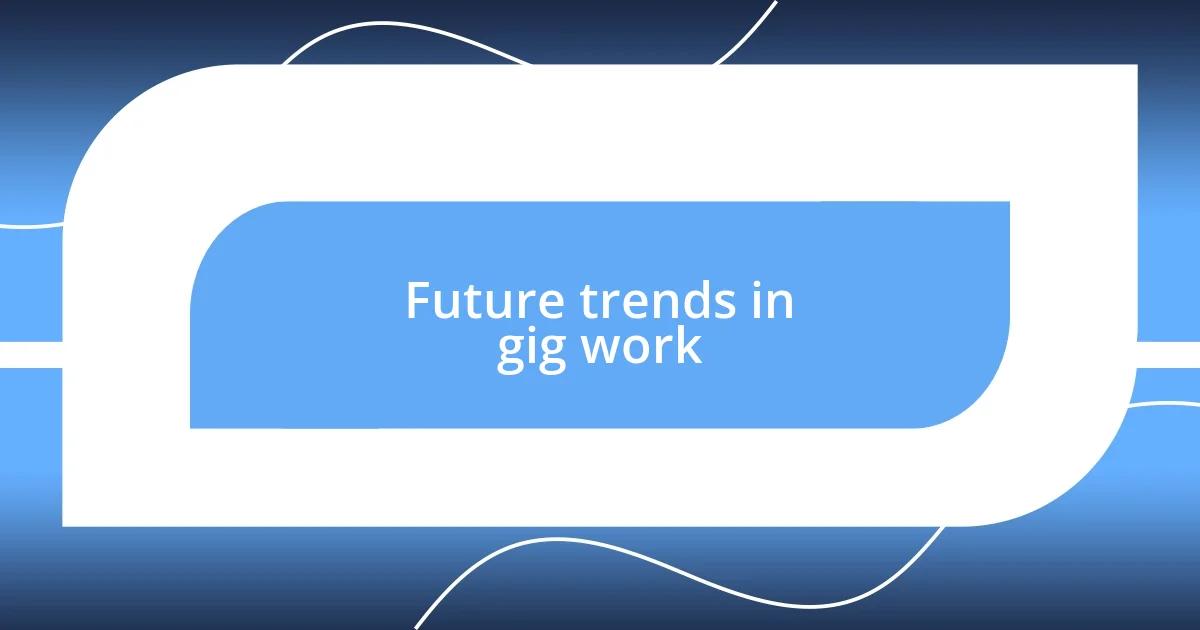
Future trends in gig work
I believe we are on the cusp of significant changes in the gig economy. For instance, I’ve noticed more professionals leveraging technology to streamline their gig work. Apps that manage schedules, finances, and client communications are becoming essential tools for gig workers like me. This tech-savvy shift is not just about convenience; it’s about creating a sustainable work-life balance without sacrificing productivity.
Moreover, the rise of niche markets is fascinating. As more individuals enter the gig economy, I see a trend towards specializing in specific skills rather than being a jack-of-all-trades. Many of my peers have carved out unique identities, from pet grooming to virtual fitness coaching, and it excites me to witness how these niches allow for deeper connections with clients. It makes me wonder: as these specialists flourish, can we redefine the notion of “job security” in a gig-driven landscape?
Lastly, I can’t help but notice the growing emphasis on community among gig workers. Recently, I participated in a local meetup for freelancers that fostered collaborations and shared resources. This sense of belonging helps counter the isolating nature of gig work. I think about how this trend can lead to a more supportive network and whether these communities may eventually pave the way for collective bargaining power. Could we be heading towards a gig economy that’s not just about individual work, but about shared success?
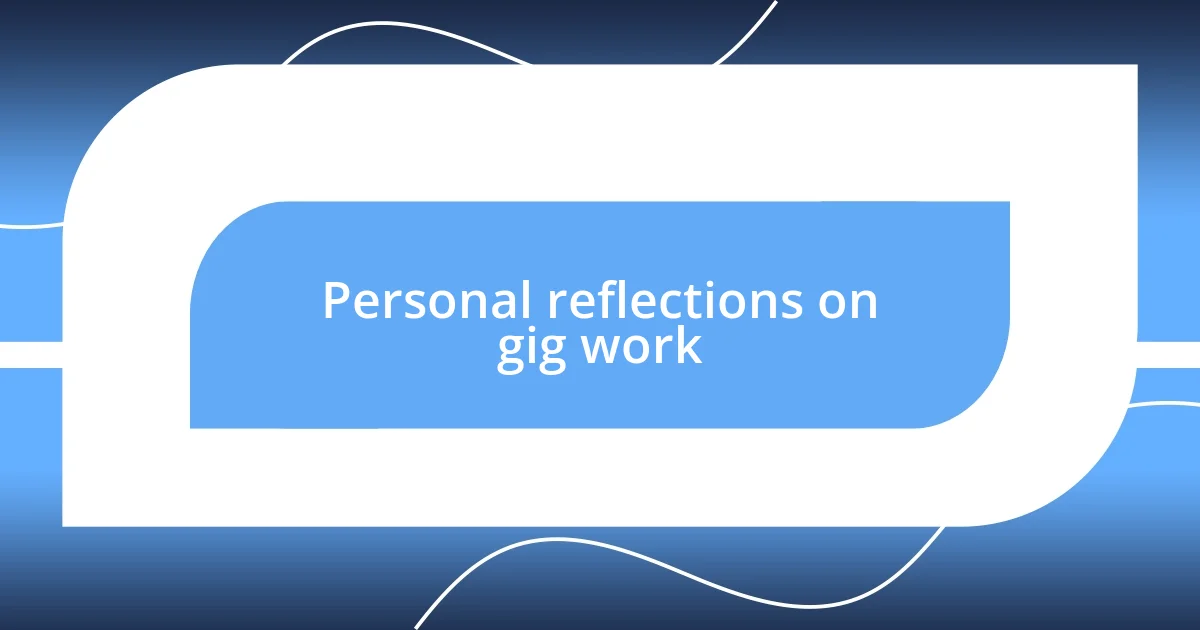
Personal reflections on gig work
Gig work has been a rollercoaster of experience for me. When I first dipped my toes into freelancing, I felt an overwhelming rush of excitement mixed with anxiety. I still remember my first project: the thrill of landing it, but the nagging fear of whether I could deliver. That moment marked the beginning of my journey into a world where every day was different, but it also taught me the importance of self-trust and adaptability.
Reflecting on this journey, I’ve come to appreciate the unique highs and lows that come with gig life. There are days when the flexibility feels like a breath of fresh air. I can take long walks, enjoy spontaneous adventures, or even work from a café with a beautiful view. But then, there are those moments when the lack of a stable routine makes me question my choices. How do I ensure a steady income while pursuing my passion for variety? It’s certainly a balancing act, but I find that embracing the uncertainties often leads to the most rewarding experiences.
What’s especially intriguing to me is the way gig work has impacted my relationships. I’ve forged connections with clients that feel more personal, almost like friendships. I recall a project where I collaborated closely with a small business owner; we shared ideas not just about work but about dreams and challenges. In that moment, it struck me: isn’t gig work more than just transactions? It’s about building a community. This brings me to ponder— as this community grows, will we create an ecosystem where gig workers unite for support, or remain isolated in our individual pursuits?












